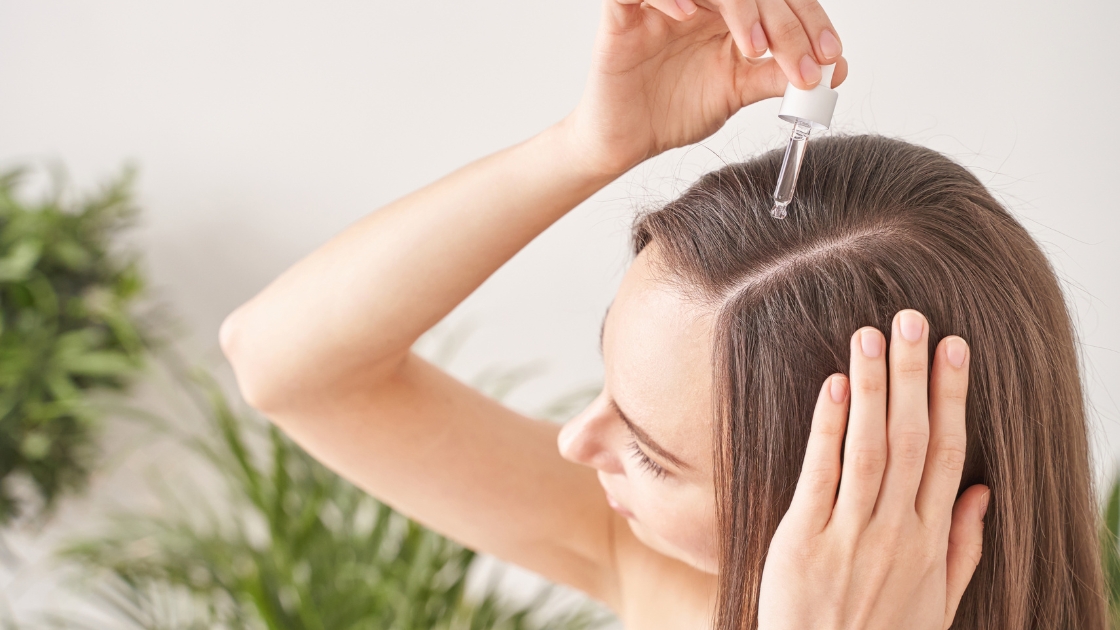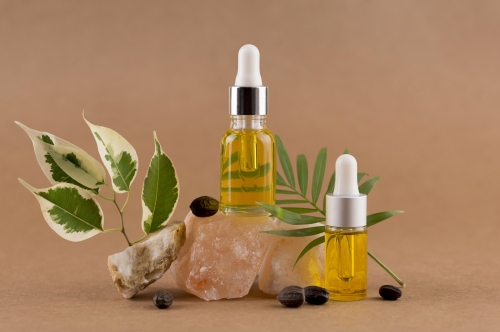Luscious Locks with Rosemary Oil for Hair: A Comprehensive Guide

Embark on a transformative journey towards luscious locks as we unlock the secrets of Rosemary Oil, a time-honored elixir that has enchanted hair care enthusiasts for centuries.
Rosemary oil, extracted from the fragrant herb Rosemary, isn't just a culinary delight; it's a treasured ingredient in the realm of hair care. As we explore its aromatic and therapeutic qualities, we invite you to discover a comprehensive guide that demystifies the art of achieving and maintaining a head full of radiant, healthy hair.
Why Rosemary Oil? This question echoes through generations of beauty rituals, and our guide holds the key. Uncover the origins and cultural significance of Rosemary Oil, delving into its rise to fame in hair care circles. From ancient remedies to modern-day solutions, this aromatic oil has stood the test of time.
This blog is your gateway to a trove of knowledge about Rosemary Oil for hair. We'll dive into its composition, exploring the beneficial elements that make it a potent force against hair woes. From preventing hair loss to promoting growth and improving overall scalp health, the spectrum of benefits is as vast as it is fascinating.
Join us on this aromatic expedition, where each section of this comprehensive guide unveils a new facet of Rosemary Oil's potential. From scientifically-backed studies to practical usage tips, we've curated a resource that caters to novices and aficionados alike. So, buckle up as we navigate through the fragrant realms of Rosemary Oil, unlocking the secrets to luscious locks that captivate and mesmerize.
What is Rosemary Oil?
- What is Rosemary Oil?
Derived from the aromatic herb Rosemary (Rosmarinus officinalis), rosemary oil is a potent and fragrant essential oil that has found its place not only in culinary delights but also as a revered elixir in the world of hair care. Its origins can be traced back to the Mediterranean region, where the herb itself has been used for centuries for its therapeutic properties.
- Origins:
Rosemary has a rich historical and cultural significance. Ancient civilizations, including the Greeks and Romans, considered it a symbol of remembrance and fidelity. The herb was often used in ceremonies, weddings, and funerals. Rosemary's association with memory even extended to Shakespearean times, where it was mentioned in plays like "Hamlet."
- Usage of Rosemary Oil for Hair:
In the context of hair care, rosemary oil stands out for its versatile and beneficial properties. It is renowned for promoting hair growth, preventing hair loss, and enhancing overall hair health. The oil is extracted through steam distillation of the rosemary plant's flowering tops, resulting in a concentrated liquid that encapsulates the herb's aromatic and medicinal qualities.
- Historical and Cultural References:
Beyond its practical uses, rosemary has been a symbol of love, loyalty, and longevity. In ancient times, it was often woven into bridal wreaths, symbolizing fidelity and happiness. The association of rosemary with memory also extended to its use as a symbol of remembrance during times of mourning.
In the realm of hair care, the historical reverence for rosemary converges with its practical benefits. It's a testament to nature's gifts that have transcended time, offering a holistic approach to hair care rooted in tradition and enriched by the wisdom of centuries.
Can rosemary oil treat hair loss?
Rosemary oil, derived from the fragrant herb Rosmarinus officinalis, is renowned not only for its culinary uses but also for its diverse health benefits, including potential treatment for hair loss. The basic health benefits of rosemary extend beyond its aromatic appeal, making it a popular choice for holistic well-being.
Basic Health Benefits of Rosemary:
Antioxidant Powerhouse: Rosemary contains antioxidants, such as rosmarinic acid and carnosic acid, which help combat oxidative stress in the body. These antioxidants may contribute to overall health by neutralizing free radicals.
Anti-Inflammatory Properties: Rosemary is known for its anti-inflammatory effects, which may aid in reducing inflammation in various parts of the body. This can have positive implications for overall health and wellness.
Improved Digestion: Traditionally used to support digestion, rosemary can help alleviate indigestion and bloating. Its aromatic compounds may stimulate digestion and promote gut health.
Cognitive Benefits: The aroma of rosemary has been linked to improved cognitive function and concentration. Inhaling its scent or using rosemary oil in aromatherapy may enhance mental clarity.
Hair-Beneficial Ingredients:
Rosemary oil boasts several hair-friendly components that contribute to its potential in addressing hair loss:
Cineole: This compound in rosemary oil has been studied for its potential to promote hair growth by improving blood circulation in the scalp.
Ursolic Acid: Known for its anti-inflammatory and anti-microbial properties, ursolic acid in rosemary oil can benefit the scalp's health.
Camphor: Rosemary oil contains camphor, which stimulates hair follicles and encourages healthy hair growth.
Preventing Hair Follicle Starvation:
Rosemary oil is believed to prevent hair follicles from being starved of blood supply, a crucial factor in maintaining healthy hair. The improved blood circulation induced by rosemary oil may ensure that hair follicles receive essential nutrients and oxygen, promoting optimal conditions for hair growth.
Incorporating rosemary oil into your hair care routine, such as through scalp massages or adding a few drops to your shampoo, may provide a natural and aromatic way to support hair health. While individual results may vary, the holistic benefits of rosemary make it a compelling option for those seeking natural solutions to hair loss.
What Studies Say About Rosemary Essential Oil for Hair
Hair loss is a common concern, and exploring natural remedies like rosemary essential oil has garnered attention, with several studies examining its potential efficacy in promoting hair growth and addressing causes of hair loss.
Causes of Hair Loss:
Hair loss can be attributed to various factors, including genetics, hormonal changes, nutritional deficiencies, and inflammation. One key contributor is the hormone dihydrotestosterone (DHT), which can shrink hair follicles over time, leading to thinner and shorter hair strands.
Medically Proven Studies:
Study 1 - "Rosemary oil vs. Minoxidil":
A comparative study published in the "Journal of the American Academy of Dermatology" found that rosemary oil was as effective as the hair growth treatment minoxidil. The study involved individuals with androgenetic alopecia, a common form of hair loss. Participants using rosemary oil experienced significant improvements in hair count and thickness.
Study 2 - "Cineole and Hair Growth":
Cineole, a compound in rosemary oil, has been the subject of research. A study published in the "Skin Pharmacology and Physiology" journal demonstrated that cineole increased hair follicles' size and promoted hair growth. This suggests that rosemary oil may stimulate hair follicles, countering the effects of DHT.
Study 3 - "Rosemary Oil and Alopecia Areata":
In a study published in "Clinical and Experimental Dermatology," rosemary oil was investigated for its potential in managing alopecia areata, an autoimmune condition causing hair loss. The study observed that rosemary oil, when combined with other essential oils, demonstrated positive effects in promoting hair regrowth.
These studies collectively highlight rosemary oil's potential to address various causes of hair loss, including hormonal factors and autoimmune conditions. While more research is needed to fully understand the mechanisms and individual variations, the existing evidence suggests that rosemary essential oil may offer a natural and effective solution for promoting hair growth.
Incorporating rosemary essential oil into your hair care routine, such as through scalp massages or adding it to your shampoo, may serve as a holistic approach to supporting hair health. Always consult with a healthcare professional for personalized advice based on your specific condition.
Hair loss can be a concern, and rosemary oil has gained attention for its potential to promote hair growth. Here are three effective methods to incorporate rosemary oil into your hair care routine:
Massage Directly into the Scalp
Benefits:
Massaging rosemary oil directly into the scalp is a direct and effective method to stimulate hair follicles. The massage action improves blood circulation, promoting nutrient delivery to hair follicles. Rosemary oil contains compounds like ursolic acid and cineole, which have been associated with hair growth promotion.
How to do it:
- Mix a carrier oil (such as jojoba or coconut oil) with a few drops of rosemary oil. A common ratio is 1-2 drops of rosemary oil per teaspoon of carrier oil.
- Part your hair and apply the oil mixture to the scalp.
- Gently massage the scalp using circular motions for about 5-10 minutes.
- Leave the oil on for at least 30 minutes or overnight for deep penetration.
- Wash your hair with a mild shampoo.
Mix Rosemary Oil into Shampoo
Benefits:
Adding rosemary oil to your regular shampoo is a convenient way to incorporate it into your hair care routine. This ensures consistent exposure to the beneficial compounds of rosemary oil during each wash.
How to do it:
- For a single use, add 5-10 drops of rosemary oil to the amount of shampoo you typically use.
- Mix the oil thoroughly with the shampoo.
- Wash your hair as usual, ensuring the shampoo with rosemary oil covers the scalp and hair.
- Rinse thoroughly.
Use Rosemary Oil in Homemade Shampoo
Benefits:
Creating a homemade shampoo allows you to customize ingredients and enhance the natural benefits of rosemary oil. This method is ideal for those who prefer a more natural and personalized hair care approach.
How to do it:
- In a bowl, combine a natural liquid castile soap (about 1 cup), water (1 cup), and 10-15 drops of rosemary oil.
- Stir the ingredients thoroughly.
- Pour the mixture into an empty shampoo bottle.
- Use this homemade rosemary shampoo as you would a regular shampoo.
- Incorporating rosemary oil into your hair care routine using these methods provides a holistic approach to support hair health. Experiment with these techniques to find the one that suits your preferences and lifestyle best.
Other Rosemary Oil Benefits for Hair
Rosemary oil isn't just a fragrant addition to your hair care routine; it offers a spectrum of benefits that contribute to overall hair health, from promoting growth to enhancing scalp well-being.
- Hair Growth Stimulation:
One of the primary benefits of rosemary oil is its ability to stimulate hair growth. The compounds in rosemary oil, particularly ursolic acid and cineole, have been shown to improve circulation in the scalp. This increased blood flow promotes nutrient delivery to hair follicles, encouraging the growth of healthier and stronger hair strands.
- Dandruff Reduction:
Rosemary oil is renowned for its anti-inflammatory and antimicrobial properties, making it an effective remedy for dandruff. Regular use of rosemary oil on the scalp helps combat fungal issues that contribute to dandruff. Additionally, its soothing properties alleviate scalp irritation, reducing flakiness and dryness associated with dandruff.
- Improved Scalp Health:
A healthy scalp is essential for vibrant hair, and rosemary oil plays a pivotal role in achieving this. By nourishing the scalp and balancing oil production, rosemary oil helps maintain optimal conditions for hair growth. It can also address issues like excess oiliness or dryness, promoting a harmonious scalp environment.
- Prevention of Hair Loss:
Beyond stimulating growth, rosemary oil may contribute to preventing hair loss. It helps counteract the effects of dihydrotestosterone (DHT), a hormone linked to hair loss. By inhibiting the production of DHT, rosemary oil helps maintain the health of hair follicles, reducing the risk of hair thinning and shedding.
- Improved Hair Texture:
Regular use of rosemary oil can contribute to improved hair texture. Its moisturizing properties hydrate the hair strands, reducing frizz and enhancing overall manageability. The result is softer, smoother, and more lustrous hair.
- Aromatic Relaxation:
While benefiting your hair, the aromatic properties of rosemary oil also offer a therapeutic experience. Inhaling its fragrance during application or through diffusers can promote relaxation and stress reduction, contributing indirectly to healthier hair by minimizing stress-related hair issues.
Incorporating rosemary oil into your hair care routine, whether through massages, homemade shampoos, or regular shampoo additions, provides a holistic approach to achieving not just beautiful, but truly healthy hair. Explore the multifaceted benefits of rosemary oil and let its natural goodness transform your hair care experience.
Side Effects of Rosemary Oil on Hair
While rosemary oil is renowned for its numerous benefits for hair, it's important to approach its usage with care to maximize its positive effects. Embracing rosemary oil in a mindful manner can significantly enhance hair health while minimizing potential side effects.
Potential Side Effects:
Skin Sensitivity: Some individuals may have skin sensitivity to essential oils, including rosemary oil. This can manifest as mild irritation, redness, or itching. However, these reactions are typically rare.
Allergic Reactions: Though uncommon, allergic reactions may occur in individuals with a pre-existing sensitivity to certain compounds in rosemary oil. Symptoms may include swelling, itching, or a rash.
Guidance for Safe Usage:
Patch Testing: Before applying rosemary oil extensively to your scalp, conduct a patch test. Apply a small amount of diluted rosemary oil to a discreet area on your skin, like the inner arm. Monitor for any adverse reactions over 24 hours. If no irritation occurs, it's generally safe for broader use.
Proper Dilution: Always dilute rosemary oil with a carrier oil, such as coconut or jojoba oil, before applying it to your scalp. This helps minimize the risk of irritation and ensures a gentle and nourishing application.
Consult a Healthcare Professional: If you experience persistent irritation, redness, or any unexpected reaction, consult a healthcare professional. They can provide personalized advice and address any concerns, ensuring your hair care routine remains a positive and beneficial experience.
Positive Emphasis on Safety:
Enhanced Blood Circulation: Rosemary oil, when used properly, enhances blood circulation to the scalp. This improved circulation contributes to healthier hair follicles and promotes optimal nutrient delivery, supporting overall hair vitality.
Holistic Scalp Health: By balancing oil production and addressing issues like dandruff, rosemary oil fosters a harmonious scalp environment. This positively impacts hair health, contributing to improved texture and appearance.
Natural Stress Relief: Inhaling the aromatic fragrance of rosemary oil during application provides a therapeutic experience, promoting relaxation and stress reduction. A calm and stress-free environment indirectly supports healthy hair growth.
Incorporating rosemary oil into your hair care routine can be a transformative experience. By approaching its usage with awareness and care, you can harness the positive potential of rosemary oil for lush, vibrant, and healthy hair.
In the journey through the benefits and applications of rosemary oil for hair, we've uncovered a treasure trove of natural wellness. From stimulating hair growth to reducing dandruff and improving scalp health, rosemary oil emerges as a holistic solution for those seeking vibrant and resilient hair.
Key Takeaways:
Hair Growth Marvel: Rosemary oil's ability to stimulate hair growth by improving scalp circulation and countering the effects of DHT positions it as a natural remedy for those looking to promote healthier, fuller hair.
Dandruff Defender: With its anti-inflammatory and antimicrobial properties, rosemary oil stands as an effective remedy for reducing dandruff, providing relief from flakiness and scalp irritation.
Balanced Scalp Harmony: By nurturing a balanced scalp environment, rosemary oil contributes to overall hair health. It addresses issues of excess oiliness or dryness, promoting optimal conditions for hair growth.
Texture Transformation: Regular use of rosemary oil contributes to improved hair texture, reducing frizz and enhancing manageability. It leaves hair softer, smoother, and more lustrous.
Aromatic Relaxation: Beyond its tangible benefits, the aromatic experience of rosemary oil provides a therapeutic journey, promoting relaxation and stress reduction, indirectly supporting healthy hair growth.
Encouragement to Readers:
As you embark on your personal exploration of rosemary oil for hair care, we encourage you to dive into the experience and share your journey. Whether through scalp massages, adding it to your shampoo, or creating your homemade rosemary-infused products, the versatility of rosemary oil allows for a customizable and enjoyable hair care routine.
Invitation to Shop Rosemary Essential Oil:
To embark on your rosemary oil journey, we invite you to explore the premium quality rosemary essential oil available at Norex. Sourced for purity and potency, Norex offers a trustworthy option for those seeking the benefits of rosemary oil in their hair care routine.
FAQs:
Can I apply rosemary oil directly to hair?
Yes, rosemary oil can be applied directly to hair, but it's advisable to dilute it with a carrier oil to prevent potential irritation.
Can I use rosemary oil every day?
Daily use of rosemary oil is generally safe, but it's recommended to start with a patch test and observe for any sensitivity or irritation.
Does rosemary oil thicken hair?
Rosemary oil's ability to stimulate hair growth and improve overall hair health may contribute to the appearance of thicker, more voluminous hair.
Who should not apply rosemary oil?
Individuals with known allergies to rosemary or other essential oils should avoid its application. Pregnant or breastfeeding individuals should consult with a healthcare professional before using rosemary oil.
In your pursuit of healthier, more vibrant hair, consider making rosemary oil an integral part of your routine. Share your experiences, and let the aromatic magic of rosemary unfold in your hair care journey.












